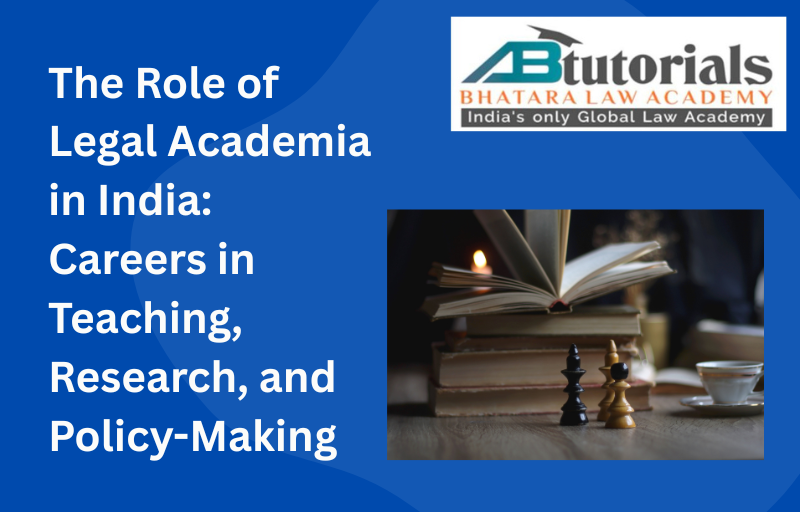The Role of Legal Academia in India: Careers in Teaching, Research, and Policy-Making
By ABT Team
29 Jul, 2025

Legal academia in India shapes the future of the legal profession, influences policy-making, and fosters research that addresses contemporary legal challenges. It has a solid framework with the help of institutions like National Law Universities and other law schools that give numerous pathways to build successful careers in teaching, research, and policy-making.
The Landscape of Legal Education
Since the first NLU was established in Bangalore in 1987, legal education in India has undergone significant changes. These institutions have transformed legal studies by offering integrated five- year programs that combine law with other disciplines, such as business or social sciences. This interdisciplinary approach not only enriches the curriculum but also prepares students for diverse career opportunities within and outside traditional legal practice.In regulation, law schools are overseen by the Bar Council of India (BCI) and the University Grants Commission (UGC). Both have ensured that the academic standards of law schools remain high. BCI focuses on professional legal education, and the UGC oversees broader educational policies, such as the qualifications of faculty and research funding. This has led to a more structured and quality-driven approach to legal academia.
Jobs in Teaching
Teaching law is one of the most prominent career paths for those who have a passion for academia. Law professors are crucial in teaching the future lawyers and in shaping legal thought. Candidates seeking to become a law academician in India would typically require an LL.M. degree with a Ph.D. in law or a related field.Key Requirements:
A Ph.D. is often required for higher academic positions.· Teaching experience and a good publication record increase employability.
· Performance in national eligibility tests (NET) is also taken into account while recruiting.
Law professors teach and mentor students, guide them through internships, and organize moot court competitions that mimic real-world legal proceedings.
· International trade law
· Intellectual property rights
· Environmental regulations
Many universities encourage faculty members to publish their findings in reputable journals and participate in conferences, fostering an environment of intellectual growth and collaboration.
· Working with think tanks on legal reform matters.
· Public interest litigation, which involves fighting systemically.
Academics may utilize their research to promote changes that embody the wishes of contemporary society. This way, they are an integral part of how Indian law transforms into being in today's world.
Research Opportunities
Another critical component of legal academia is research. Scholars advance the development of legal theory and practice by critically analyzing the laws, policies, and the impacts on society. The range of research topics can vary from constitutional law to newer areas such as cyber law and environmental law.Impactful Research Areas:
· Human rights law· International trade law
· Intellectual property rights
· Environmental regulations
Many universities encourage faculty members to publish their findings in reputable journals and participate in conferences, fostering an environment of intellectual growth and collaboration.
Policy-Making Roles
Legal academicians often find themselves at the intersection of academia and public policy. Their expertise is invaluable in advising government bodies, NGOs, and international organizations on legislative reforms and policy development. Engaging with policymakers allows legal scholars to influence laws that govern society.Opportunities for Involvement:
· Serving on advisory committees or task forces.· Working with think tanks on legal reform matters.
· Public interest litigation, which involves fighting systemically.
Academics may utilize their research to promote changes that embody the wishes of contemporary society. This way, they are an integral part of how Indian law transforms into being in today's world.
Conclusion
The role of legal academia in India extends well beyond traditional teaching, encompassing extensive research and policy-making that significantly impacts society at large. With appropriate education, focus on research, and service to the people, young minds can carve a satisfying career for themselves in this dynamic sector. As India progresses toward overcoming the challenging legal issues at hand, legal academicians are going to make all the difference in building an equitable and just society.Recent Articles
-
09 Sep, 2025
CHALLENGES CONFRONTING INDIA'S LEGAL EDUCATION SYSTEM: BRIDGING THE GAPS BETWEEN THEORY AND PRACTICE
By ABT Team
-
12 Aug, 2025
How to Become a Lawyer in the UK as an International Student – A Guide for Foreign Students
By ABT Team
-
05 Aug, 2025
Comparative Analysis of Legal Education Systems: India vs. Global—Learning from International Practices
By ABT Team
-
29 Jul, 2025
The Role of Legal Academia in India: Careers in Teaching, Research, and Policy-Making
By ABT Team
-
22 Jul, 2025
The Role of International Organizations in Career Building for Indian Lawyers: Opportunities in UN, WTO, and Other Global Institutions
By ABT team
-
15 Jul, 2025
Legal Aspects of Immigration and Career Opportunities: Pathways in Visa, Refugee, and Immigration Law
By ABT Team
-
08 Jul, 2025
Building an International Law Career from India: Opportunities in Cross- Border Trade, Diplomacy, and Human Rights
By ABT TEAM
-
01 Jul, 2025
Introduction: New Frontiers of Legal Practice and Digital Contracts Using Blockchain Technology
By ABT Team
-
24 Jun, 2025
Careers in Intellectual Property Rights Law: Protecting Innovations
By ABT TEAM
-
17 Jun, 2025
Artificial Intelligence in Law: Revolutionising Legal Practice
By ABT Team

